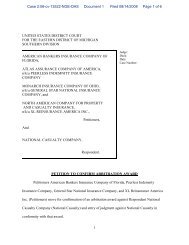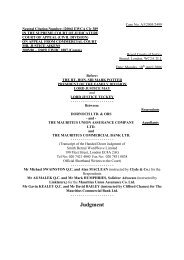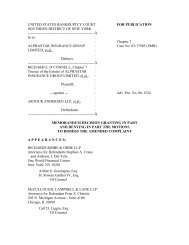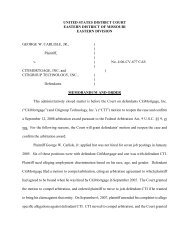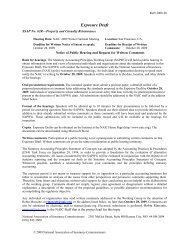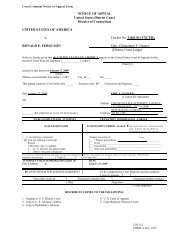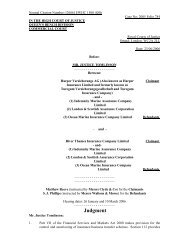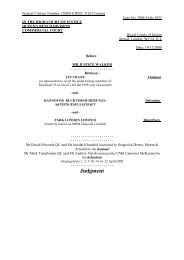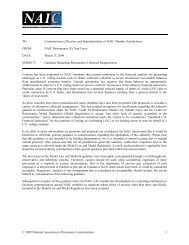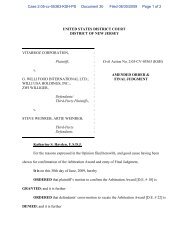Judgment - Reinsurance Focus
Judgment - Reinsurance Focus
Judgment - Reinsurance Focus
Create successful ePaper yourself
Turn your PDF publications into a flip-book with our unique Google optimized e-Paper software.
any tier, its and their parent, affiliates and<br />
subsidiary companies and its and their officers,<br />
employees, personnel and agents.”<br />
(a) The position of Sembawang<br />
32.<br />
Against this contractual background Mr. Flaux submitted that Sembawang's insurable interest<br />
in the vessel was limited to the loss it would suffer by reason of any liability to make<br />
good loss of or damage to the vessel. In the present case it was not liable for making<br />
good the damage caused by the flooding and so could not have retained any part of<br />
the proceeds of the policy. Accordingly, it suffered no loss as a result of not being a<br />
co-assured.<br />
33.<br />
The foundation for this submission is to be found in clause 15 of the contract terms. Mr.<br />
Flaux submitted that, taken together, the provisions covering liability and insurance<br />
demonstrate an intention that neither Sembawang nor any of its sub-contractors was<br />
to be liable for loss of or damage to the vessel insofar as it was capable of being<br />
covered by insurance of the kind referred to in that clause. In support of that<br />
submission he drew our attention to two authorities, Mark Rowlands Ltd v Berni Inns<br />
Ltd [1986] Q.B. 211 and Scottish and Newcastle Plc v GD Construction (St Albans)<br />
Ltd [2003] EWCA Civ 16, [2003] Lloyd's Rep. I.R. 809.<br />
34.<br />
In Mark Rowlands Ltd v Berni Inns Ltd the defendant was the tenant of part of a building<br />
under a lease which provided that the plaintiff should insure the whole building<br />
against fire, that the defendant should contribute to the costs of insurance and that in<br />
the event of damage to the building by fire the defendant should be relieved of his<br />
repairing obligation and the plaintiff would lay out the insurance moneys to repair or<br />
rebuild the defendant's premises. The building was destroyed by a fire started by the<br />
negligence of the defendant and the plaintiff's insurers, having paid the claim, brought<br />
proceedings against the defendant in the name of the plaintiff in the exercise of their<br />
rights of subrogation. The first question to be considered was whether the parties had<br />
intended that the insurance should enure for the benefit of the defendant. The court<br />
held that they had and that there was nothing in law to prevent that from occurring.<br />
Kerr L.J., with whom Croom-Johnson and Glidewell L.JJ. agreed, explained the<br />
position as follows in a passage in his judgment at page 226B which is also relevant<br />
to one of the other arguments addressed to us on this appeal:<br />
“I therefore turn to the question whether there is anything in<br />
law which precludes the conclusion that the insurance effected<br />
by the plaintiff in this case was also intended to enure for the<br />
benefit of the defendant. In my view the answer is no. Provided<br />
that a person with a limited interest has an insurable interest in<br />
the subject matter of the insurance - an issue to which I turn in<br />
a moment in relation to the circumstances of the present case -<br />
there is no principle of law which precludes him from asserting<br />
that an insurance effected by another person was intended to<br />
enure for his benefit to the extent of his interest in the subject


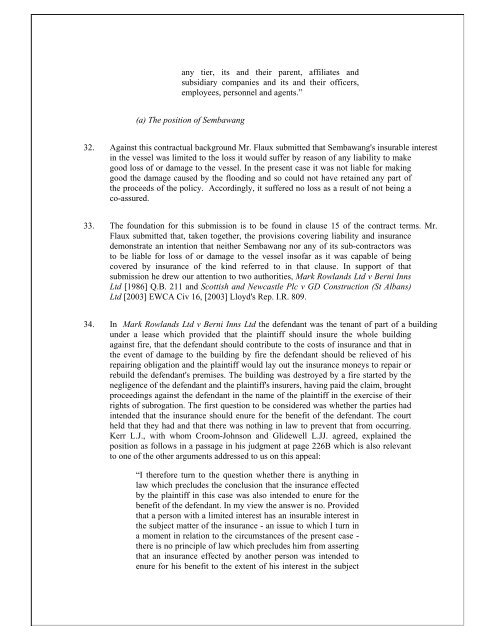
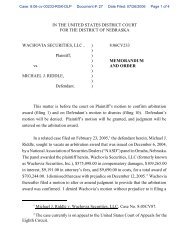
![202 Folio No 734 Neutral Citation Number: [2006] EWHC 1345 (QB ...](https://img.yumpu.com/50015000/1/184x260/202-folio-no-734-neutral-citation-number-2006-ewhc-1345-qb-.jpg?quality=85)
